UPDATE 2/7/2022: Final approval was granted for the settlement of this “forever chemical” on behalf of Hoosick Fall residents and businesses. In its order granting final approval to the settlement, the Court observed that there was a significant positive reaction from the class. Over 2,300 claims were filed, including approximately 70% of property and nuisance claims and 60% of medical monitoring claims.
Attorneys from Weitz & Luxenberg were co-leaders on the team that secured the proposed $65.25 million settlement for the Hoosick Falls community whose drinking water supply is contaminated by PFOA (perfluorooctanoic acid). This settlement helps to compensate people living in Hoosick Falls for the losses and injuries they sustained from exposure to the toxic chemical PFOA, sometimes referred to as the “forever chemical.”
The defendants, Saint-Gobain Performance Plastics Corp., 3M Co., and Honeywell International Inc., have agreed to a proposed class settlement for the residents. The remaining defendant, E.I. DuPont de Nemours & Co., is not participating in the settlement.
This settlement agreement is for the case Michelle Baker et al. v. Saint-Gobain Performance Plastics Corp. et al., currently pending in the U.S. District Court for the Northern District of New York. Saint-Gobain and Honeywell were accused of mishandling the PFOA. 3M and DuPont were accused of manufacturing it knowing that it would contaminate the environment and injure people.
Financial Compensation and Medical Monitoring
There are four settlement classes. The payout amounts are broken up by class: (1)
- Approximately $21 million for residents in the Municipal Water Property Settlement Class or Private Well Water Property Settlement Class.
- Almost $8 million for residents in the Nuisance Settlement Class.
- Nearly $23 million for residents in the Medical Monitoring Settlement Class.
The settlement includes a significant medical monitoring program. Monitoring services are being provided for 10 years. The program tests for PFOA exposure and evaluates people for potential disease from exposure to the toxic chemical.
Another key aspect of the settlement is that people can still sue for illnesses in the future caused by PFOA. The chemical PFOA has been recognized as potentially causing a number of illnesses.
These include a range of adverse health events such as increased risk of cancers, developmental issues, reproductive problems, and immunological effects. Other potential illnesses include high cholesterol, ulcerative colitis, thyroid disease, and preeclampsia/pregnancy-induced hypertension. (2) (3)
PFOA Is a Forever Chemical
Robin L. Greenwald, head of Weitz & Luxenberg’s Environmental, Toxic Tort & Consumer Protection Unit, asserts that “Dangerous chemicals, such as PFOAs, are ‘forever chemicals’ that remain in drinking water supplies and in your body. When corporations manufacture products, and their processes cause these toxic chemicals to escape into the environment, property values decrease and people are at risk of serious illness.”
Attorneys from Weitz & Luxenberg are part of a team who negotiated the proposed settlement reached. The plaintiffs are represented by a group consisting of Ms. Greenwald, James J. Bilsborrow of Seeger Weiss LLP, Stephen Schwarz and Hadley L. Matarazzo of Faraci Lange LLP and Gerald Williams of Williams Cedar LLC.
Honeywell and Saint-Gobain began funding water treatment systems to remove PFOA from the drinking water supply after the case was filed. Honeywell indicated PFOA has not been detected in the municipal water supply since March 2016. (4)
“It is fair and just that large corporations such as these defendants pay for the injuries they caused our clients. Not only did these companies put PFOA into the environment, but they knew of the risks and never let the people actually drinking the water know. They deserve to pay for their callous disregard of the residents of Hoosick Falls,” declares Ms. Greenwald.
Hoosick Falls Case Background
The Village of Hoosick Falls is a small town in central upstate New York. There were once a number of manufacturing plants in the area.
The facilities used PFOA during their manufacturing processes. PFOA is in Teflon products, including pots and pans, in addition to a number of other consumer products. These include treatments to make fabric and clothing resist stains and spills. Waste was discharged from these companies, putting PFOA into the water and environment.
The PFOA in the Hoosick Falls water supply exceeded the levels the U.S. Environmental Protection Agency (EPA) considered safe. The EPA recommended that residents not drink the water or use it for cooking. (5)
A facility on McCaffrey Street used a foam containing PFOA for more than 30 years. The foam polluted the groundwater and the air. The facility was owned by Honeywell and now is owned by Saint-Gobain.
Teflon products were manufactured at the facility by 3M and DuPont. The lawsuit claims that these companies knew about the PFOA health risks, but failed to warn the residents in the area about them.
Toxic Chemical Lawsuit Wins
Weitz & Luxenberg attorneys have a relevant history of settling and winning toxic substances exposure lawsuits. Other significant wins for our clients include a $423 million settlement against large oil companies for contaminating public water systems with MTBE (methyl tertiary butyl ether).
Ms. Greenwald also was co-lead counsel in the Roundup weed killer litigation and the settlement against Monsanto for clients diagnosed with the cancer Non-Hodgkin Lymphoma after exposure to glyphosate.
Ms. Greenwald also served a major role in achieving an $18.7 billion settlement with BP for the Gulf of Mexico oil spill, a disaster affecting large swathes of the Gulf Coast population and environment.


